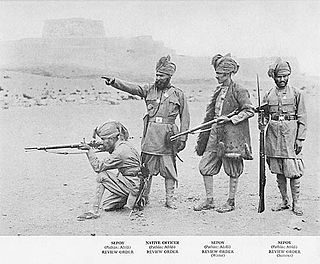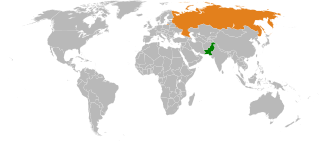Related Research Articles

The Treaty on the Non-Proliferation of Nuclear Weapons, commonly known as the Non-Proliferation Treaty or NPT, is an international treaty whose objective is to prevent the spread of nuclear weapons and weapons technology, to promote cooperation in the peaceful uses of nuclear energy, and to further the goal of achieving nuclear disarmament and general and complete disarmament. Between 1965 and 1968, the treaty was negotiated by the Eighteen Nation Committee on Disarmament, a United Nations-sponsored organization based in Geneva, Switzerland.

The Pakistan Armed Forces are the combined military forces of Pakistan. They are the sixth-largest in the world in terms of active military personnel and consist of three formally uniformed services—the Army, Navy, and Air Force, which are backed by various constitutionally−sanctioned paramilitary forces. A critical component to the armed forces' structure is the Strategic Plans Division Force, which is responsible for the maintenance and safeguarding of Pakistan's tactical and strategic nuclear weapons stockpile and assets. The chain of command of the Pakistan Armed Forces is organized under the Chairman of the Joint Chiefs of Staff Committee (JCSC) alongside the chiefs of staff of the Army, Navy, and Air Force. All branches are systemically coordinated during joint operations and missions under the Joint Staff Headquarters (JSHQ).
Smiling Buddha was the assigned code name of India's first successful nuclear bomb test on 18 May 1974. The bomb was detonated on the army base Pokhran Test Range (PTR), in Rajasthan, by the Indian Army under the supervision of several key Indian generals.

Nuclear warfare is a military conflict or political strategy which deploys nuclear weaponry. Nuclear weapons are weapons of mass destruction; in contrast to conventional warfare, nuclear warfare can produce destruction in a much shorter time and can have a long-lasting radiological result. A major nuclear exchange would have long-term effects, primarily from the fallout released, and could also lead to a "nuclear winter" that could last for decades, centuries, or even millennia after the initial attack. Some analysts dismiss the nuclear winter hypothesis, and calculate that even with nuclear weapon stockpiles at Cold War highs, although there would be billions of casualties, billions more rural people would nevertheless survive. However, others have argued that secondary effects of a nuclear holocaust, such as nuclear famine and societal collapse, would cause almost every human on Earth to starve to death.

World War III and the Third World War are names given to a hypothetical third worldwide large-scale military conflict subsequent to World War I and II. The term has been in use since at least as early as 1941. Some have applied it loosely to refer to limited or smaller conflicts such as the Cold War or the War on Terror, while others assumed that such a conflict would surpass prior world wars both in its scope and in its destructive impact.

Since the Partition of British India in 1947 and subsequent creation of the dominions of India and Pakistan, the two countries have been involved in a number of wars, conflicts, and military standoffs. A long-running dispute over Kashmir and cross-border terrorism have been the predominant cause of conflict between the two states, with the exception of the Indo-Pakistani War of 1971, which occurred as a direct result of hostilities stemming from the Bangladesh Liberation War in erstwhile East Pakistan.

Nuclear terrorism refers to any person or persons who detonate a nuclear weapon as an act of terrorism. Some definitions of nuclear terrorism include the sabotage of a nuclear facility and/or the detonation of a radiological device, colloquially termed a dirty bomb, but consensus is lacking. In legal terms, nuclear terrorism is an offense committed if a person unlawfully and intentionally "uses in any way radioactive material … with the intent to cause death or serious bodily injury; or with the intent to cause substantial damage to property or to the environment; or with the intent to compel a natural or legal person, an international organization or a State to do or refrain from doing an act", according to the 2005 United Nations International Convention for the Suppression of Acts of Nuclear Terrorism.

The Indo-Pakistani War of 1971 was a military confrontation between India's Mitro bahini forces and Pakistan that occurred during the liberation war in East Pakistan from 3 December 1971 to the fall of Dacca (Dhaka) on 16 December 1971. The war began with Operation Chengiz Khan's preemptive aerial strikes on 11 Indian air stations, which led to the commencement of hostilities with Pakistan and Indian entry into the war for independence in East Pakistan on the side of Bengali nationalist forces. Lasting just 13 days, it is one of the shortest wars in history.

The Kargil War, also known as the Kargil conflict, was an armed conflict fought between India and Pakistan from May to July of 1999 in the Kargil district of Kashmir and elsewhere along the Line of Control (LoC). In India, the conflict is also referred to as Operation Vijay, which was the name of the Indian military operation to clear out the Kargil sector. The Indian Air Force's role in acting jointly with Indian Army ground troops during the war was aimed at flushing out regular and irregular troops of the Pakistan Army from vacated Indian positions along the LoC. This particular operation was given the codename Operation Safed Sagar.

The Pokhran-II tests were a series of five nuclear bomb test explosions conducted by India at the Indian Army's Pokhran Test Range in May 1998. It was the second instance of nuclear testing conducted by India; the first test, code-named Smiling Buddha, was conducted in May 1974.

The Lahore Declaration was a bilateral agreement and governance treaty between India and Pakistan. The treaty was signed on 21 February 1999, at the conclusion of a historic summit in Lahore, and ratified by the parliaments of both countries the same year.

The military history of Pakistan encompasses an immense panorama of conflicts and struggles extending for more than 2,000 years across areas constituting modern Pakistan and greater South Asia. The history of the modern-day military of Pakistan began in 1947, when Pakistan achieved its independence as a modern nation.
The 2001–2002 India–Pakistan standoff was a military standoff between India and Pakistan that resulted in the massing of troops on both sides of the border and along the Line of Control (LoC) in the region of Kashmir. This was the second major military standoff between India and Pakistan following the successful detonation of nuclear devices by both countries in 1998, the first being the Kargil War of 1999.

Independence Day, observed annually on 14 August, is a national holiday in Pakistan. It commemorates the day when Pakistan achieved independence and was declared a sovereign state following the end of the British Raj in 1947. Pakistan came into existence as a result of the Pakistan Movement, which aimed for the creation of an independent Muslim state in the north-western regions of British India via partition. The movement was led by the All-India Muslim League under the leadership of Muhammad Ali Jinnah. The event was brought forth by the Indian Independence Act 1947 under which the British Raj gave independence to the Dominion of Pakistan which comprised West Pakistan and East Pakistan. In the Islamic calendar, the day of independence coincided with Ramadan 27, the eve of which, being Laylat al-Qadr, is regarded as sacred by Muslims. The main Independence Day ceremony takes place in Islamabad, where the national flag is hoisted at the Presidential and Parliament buildings. It is followed by the national anthem and live televised speeches by leaders. Usual celebratory events and festivities for the day include flag-raising ceremonies, parades, cultural events, and the playing of patriotic songs. A number of award ceremonies are often held on this day, and Pakistanis hoist the national flag atop their homes or display it prominently on their vehicles and attire.
The political history of Pakistan is the narrative and analysis of political events, ideas, movements, and leaders of Pakistan. Pakistan gained independence from the United Kingdom on 14 August 1947, when the Presidencies and provinces of British India was divided by the United Kingdom, in a region which is commonly referred to as the Indian subcontinent. Since its independence, Pakistan has had a colorful yet turbulent political history at times, often characterized by martial law and inefficient leadership.
Events from the year 2006 in Pakistan.

Pakistan Day or Pakistan Resolution Day, also Republic Day, is a national holiday in Pakistan commemorating the Lahore Resolution passed on 23 March 1940 and the adoption of the first constitution of Pakistan during the transition of the Dominion of Pakistan to the Islamic Republic of Pakistan on 23 March 1956 making Pakistan the world's first Islamic republic. A Republic Day parade by the armed forces is often part of the celebrations.

Pakistan–Russia relations or Russo-Pakistani relations refers to the bilateral relations between the Islamic Republic of Pakistan and the Russian Federation. The Soviet Union and Pakistan first established the diplomatic and bilateral relations on 1 May 1948. On May 1, 2018, Pakistan celebrated the 70th Anniversary of Diplomatic Relations with Russia.

There was an attack by four heavily armed terrorists on 18 September 2016, near the town of Uri in the Indian former state of Jammu and Kashmir. It was reported as "the deadliest attack on security forces in Kashmir in two decades". The terrorist group Jaish-e-Mohammed was involved in the planning and execution of the attack. At the time of the attack, the Kashmir Valley region was a centre of unrest.

The Pakistan Day Parade also known as the National Day Joint Services Parade is an annual event held at Shakarparian in the Pakistani capital of Islamabad on the occasion of the Pakistan Day. It specifically celebrates the anniversary of the Lahore Resolution of 1940. It is overseen by the President of Pakistan as well as the Prime Minister of Pakistan.
References
- ↑ Pakistan marks National Day with first military parade in seven years
- ↑ In the face of terror: Pakistan shows off military prowess
- ↑ With Military Parade, Pakistan Sends Message to India, Taliban
- ↑ Pakistan showcases modern weapons in national day parade
- ↑ Pakistan holds first Republic Day parade in seven years
- ↑ Prades refresh nation’s patriotism on Pakistan Day
- ↑ Confident Pakistan Holds First Republic Day Parade in 7 Years
- ↑ Pakistan’s military marks National Day with its first parade since 2008
- ↑ Parades to Fear, Not Celebrate
| | This Pakistan-related article is a stub. You can help Wikipedia by expanding it. |